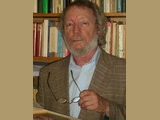Von "Österreich auf Kurzwelle" zu "Radio Österreich International"
Radio Österreich International
Englische Redaktion
Murray Gordon Hall
* 25. Mai 1947, Winnipeg, Manitoba; † 04. September 2023, Wien, Österreich
Germanist und außerordentlicher Professor für Neuere Deutsche Literatur an der Universität Wien.
Hall studierte ab 1972 Germanistik an der Universität Wien. 1975 promovierte er mit einer Dissertation zum Thema „Tier und Tiermotivik im Prosawerk Robert Musils“. Im Sommer 1974 gehörte er zu den Organisatoren einer großen Robert-Musil-Festausstellung in der Österreichischen Nationalbibliothek. Er wurde Vorstandsmitglied der „Internationalen Robert-Musil-Gesellschaft“. Außerdem beschäftigte er sich intensiv mit der österreichischen Verlagsgeschichte. Seine zweibändige Abhandlung zu diesem Thema (1985) gilt als Standardwerk. 1987 habilitierte sich Hall und führte seitdem zahlreiche Vorlesungen und Seminare am germanistischen Institut der Universität Wien durch. Seit Juli 1995 arbeitet Murray G. Hall als Redakteur beim ORF, Radio Österreich International. Am 11. Dezember 2002 wurde er mit dem „Goldenen Ehrenzeichen um die Verdienste des Landes Wien“ ausgezeichnet [1]. Er war Herausgeber des Katalogs zur Ausstellung „Geraubte Bücher“ [2], die vom 10. Dezember 2004 bis 27. Februar 2005 in der Österreichischen Nationalbibliothek stattfand. Seit 2006 ist Hall Vorsitzender der „Gesellschaft für Buchforschung in Österreich“ und Mitherausgeber der dortigen Schriftenreihe zur Buchwissenschaft.
Auszeichnungen: 1984 Kardinal-Innitzer-Preis, Förderungspreis für seine Verlagsgeschichte; 2002 „Goldenes Ehrenzeichen um die Verdienste des Landes Wien“; 2007 Preis des Vereins Buchkultur e.V. für herausragende Leistungen zur Buchkultur, gemeinsam mit dem Autorenteam (Christina Köstner, Margot Werner) für den Katalog „Geraubte Bücher“ (2004).
Werke: Der Fall Bettauer. - Wien, Kleinenzersdorf: Löcker Verlag, 1978. - 219 S. - ISBN 3-85409-002-1 -- Die Muskete : Kultur- und Sozialgeschichte im Spiegel einer satirisch-humoristischen Zeitschrift, 1905-1941 / beteiligt: Murray G. Hall ... - Wien: Edition Tusch, 1983. - 235 S. - ISBN 3-85063-137-0 -- Österreichische Verlagsgeschichte 1918 - 1938. - Wien/Köln/Graz: Böhlau Verlag, 1985. - in 2 Bänden: Bd. 1.: Geschichte des österreichischen Verlagswesens. - 427 S. - (Literatur und Leben ; N.F., 28,1). - ISBN 3-205-07258-8 u. ISBN 3-412-05585-9; Bd. 2: Belletristische Verlage der Ersten Republik. - 600 S. - (Literatur und Leben ; N.F., 28,2). - ISBN 3-412-05585-9 u. ISBN 3-205-07258-8 -- Handbuch der Nachlässe und Sammlungen österreichischer Autoren / Murray G. Hall u. Gerhard Renner. - Wien/Köln/Weimar: Böhlau, 1992. - VIII, 344 S. - (Literatur in der Geschichte, Geschichte in der Literatur ; Bd. 23). - ISBN 3-205-05528-4 -- Der Paul-Zsolnay-Verlag : von der Gründung bis zur Rückkehr aus dem Exil. - Tübingen: Niemeyer Verlag, 1994. - X, 841 S. - (Studien und Texte zur Sozialgeschichte der Literatur ; Bd. 45). - ISBN 3-484-35045-8 -- Der Paul Zsolnay Verlag 1924 - 1999. Dokumente und Zeugnisse (Co-Autor: Herbert Ohrlinger). Wien: Paul Zsolnay Verlag, 1999. - ISBN 3-552-04948-7 -- Carl Junker: Zum Buchwesen in Österreich : gesammelte Schriften (1896 - 1927) / Hrsg. von Murray G. Hall. - Wien: Edition Praesens, 2001. - 677 S. - (Buchforschung; 2). - ISBN 3-7069-0058-0 -- Geraubte Bücher : die Österreichische Nationalbibliothek stellt sich ihrer NS-Vergangenheit ; Ausstellung vom 10. Dezember 2004 bis 23. Januar 2005 / hrsg. von Murray G. Hall ... - Wien: Österr. Nationalbibliothek, 2004. - 189 S. - ISBN 3-01-000035-9 -- „... allerlei für die Nationalbibliothek zu ergattern...“ : Eine österreichische Institution in der NS-Zeit / Murray G. Hall u. Christina Köstner. - Wien: Böhlau Verlag, 2006. - 560 S. - ISBN 3-205-77504-X / ISBN 978-3-205-77504-1
Literatur -- Gerhard Renner & Wendelin Schmidt-Dengler (Hrsg.): Buchforschung und Literaturgeschichte: Festschrift für Murray G. Hall zum 60. Geburtstag. Wien: Edition Praesens, 2007. ISBN 978-3-7069-0476-6
(Quellen: Wikipedia; Der Standard -> ![]() ext. Link
ext. Link
Canadian books boffin finds a home in Vienna Schrebergarten
By Thomas Hochwarter
Moving from the flatlands of the Canadian prairie to the Alpine republic of Austria might have been a wrench for some people, but for a Canadian philosopher it was like coming home.
Speaking to the Austrian Times, Murray Hall - who for years was the voice of English language broadcasting on the ORF - reveals how he made Austria his home and worked himself up to become one of central Europe’s most respected literature scientists. Hall, who grew up in the prairie province of Manitoba, says he was always "fascinated by languages." The 62-year-old, who admits he was an "average student" when he was young, says growing up was not easy because his family moved a lot. "My father was in the Canadian army. That’s why I went to 13 different schools." As a youth, Hall found passion in reading books about young people in other countries. Hall decided to spend a semester abroad while studying German philology and Romance studies at the University of Kingston, Ontario. The southern German city of Freiburg became his destination. "I mainly chose Freiburg because it was a rather small place and I was hoping this will help me getting along. It was in the year 1968 - but there weren’t so many things going on there as in Berlin or Paris," he says today. Hall went on to settle in Austria two years later where he "immediately immersed himself in the culture and language."
Hall took his doctoral degree in philology in 1975 with a dissertation about late Austrian novelist Robert Musil. Hall subsequently became a board member of the Austrian Robert Musil Society. By 1974, Hall had organised an exhibition on the renowned author at the National Library in Vienna. Musil stayed a centrepiece of many of Hall’s projects.Speaking about his passion for the writer, who fled Austria when the country annexed the Third Reich in 1938, Hall says: "A professor in Canada made me aware of Robert Musil. It seemed to me he was praised as a major writer outside Austria rather than by his compatriots. But I think that has changed in the meantime." Hall became an indispensible institution at Vienna University where he manages various literature and philology projects to this day. The father of two adult sons was even given Austrian citizenship in 1992 as a sign of appreciation for his achievements. "I am proud about working my way up from where I came from – the flat lands of Manitoba," he says smiling – but is quick to add: "Many people – like (much-adored late literature expert) Wendelin Schmidt-Dengler – helped me along the way. He was kind of my mentor and promoter." Hall always was an outspoken critic of unpleasant developments when it comes to topics like insufficient subsidy for research and projects at the university by the government. "I really have to say the level of subsidising for projects got worse in the past two years. All kinds of projects are not getting same amount of money they used to get. "I think that’s a shame because it robs young people off their chance to continue on working in their field. It is a sad development that more and more projects cannot be approved because of financial reasons," he says.
Another recent blow for Hall was his departure at national broadcaster ORF. He does not try to hide his disappointment about the station’s decision to axe its English programme on Ö1 radio.
"I worked for Ö1 for 32 years and partly left for personal reasons. I did the English news in the morning and it is hard to get up at 4am. It means you cannot go out at night. I also wanted to spend more time on lecturing and different projects. "Another reason why I left was the ORF’s move to abandon the English services on Ö1. The (supervisory body) Stiftungsrat made the decision based on, I think, incorrect information on what we were broadcasting. "We did the information programme from Austria in English for more than 30 years – on air, on shortwave and online. It was cancelled altogether last December. "The ORF recently apparently currently tries to get rid of as many people as possible to cut costs and save money – but I also think it could lose its reputation. Mostly older and experienced people were affected. Many received ‘golden handshake’ offers. And young people not getting the type of contract we used to get. "I am very disappointed about them getting rid of the English service on Ö1 as I regard Austria as an internationally-minded country. I think a country where international organisations are based needs to give a voice to the world abroad which is understood."
Hall says there have now and then been a few difficulties in getting used to the Austrian way of life. "I struggled with bureaucracy when I came here," he admits. "I think many institutions and offices have too rigid opening times and some civil servants have got a difficult attitude. But I also have to say many of these things changed in the meantime. Vienna is more modern now than it was when I came here," he added. Vienna’s cultural offers are what Hall especially loves about living in the Austrian capital. He says: "The opera and the city’s theatres – the offer is unique, I think. And I like the fact it is a clean city. I love its surrounding areas like the Wienerwald (Vienna Woods) as well."
Speaking about the Austrian mentality, one quirky thing comes to Hall’s mind: "I used to say Americans live to work while Austrians work to live. What I soon found funny here was that many people seem to be keen on opting for early retirement. I tend to joke Austrians aged 18 are presented two option when they graduate: to start working or studying – or to retire instantly." Hall says he sees more pioneering spirit in the Canadian mentality than in the Austrian. "There is a ‘let’s do it’ spirit everywhere in America. People rather try out things and start new projects instead of immediately saying to themselves: ‘Da kann man nichts machen!’ (A popular Austrian term saying ‘It won’t work out and there is nothing you can do about that.’)," he explains. Hall says he strongly disagrees with the right-wing mindset - which is widespread in Austria, as recent elections have shown. "Integration and immigration are perennial problems – you can’t close your eyes to them," he says. "I think it’s unfortunate immigration is not presented as an enrichment for the country." Nevertheless, Hall – who is married to an Austrian – feels home in Austria. "I only visit Canada once every couple of years," he says.
Hall reveals reading is an activity which does not just fill a vast part of his profession but also his free-time. He says: "I enjoy reading for pleasure as opposed to works I have to read. "And I love gardening which often feels like a relief to me. I live in a flat but I have a Schrebergarten (allotment) in the 14th district," he adds. Asked what he thinks about the popular prejudice that people owning allotments are a bit narrow-minded and like to argue a lot with their neighbours about tiny issues, he admits: "I used to joke about it myself! I claimed the gates at these communities are so wide so people can put up all their warning signs to say what you are not allowed to do there – no sneezing between three and four and so on," he laughs. "But where I have my place there are no real disputes. The whole atmosphere is very relaxed."
Hall says he sees himself spending the rest of his life in Austria. "I do not consider myself as a foreigner after all these years. I use to say I am now part of the furniture here," he smiles. (Quoted from Austrian Times)


